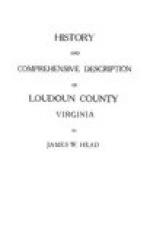“1780, March: Hardage Lane, Gent, L83 8s.
“1780, April:
Thomas George, L15. Farling Ball, Gent, L99
6s. Wm. Douglass,
Gent, L69 10s.
“1780, June: John Tyler, Gent, L40. Pierce Bayly, Gent, L20.
“1780, August:
John Orr, Gent, L500. Wm. Douglass, Gent,
L44.
“1780, November:
Thomas George, L221. Farling Ball, L50.
George Tyler, Gent,
L8. George Emrey, Gent, L163 12s.
“1781, March: John Orr, Gent, L431 16s. Wm. Cavans, L120.
“1782, Feb.:
John Orr, as per acct., for furnishing Mary
Butler, a soldier’s
wife, with necessaries.”
Close of the Struggle.
On the 25th of November, 1783, the British army evacuated New York. The independence of the United States had been acknowledged by the British Government and the war was ended. During the following month most of the Continental troops from Loudoun returned to their homes, many of them to spend the remainder of their days in hard-earned peace.
WAR OF 1812.
The Compelling Cause.
Following the Revolution, a number of new towns sprang into being, educational institutions multiplied, the population of the County steadily increased, and the people were industrious, enterprising, and happy.
A second difficulty, however, soon interrupted this tranquillity, and the quarrel between the two governments was referred to the arbitrament of the War of 1812, fought by the United States against England for maritime independence.
The honor of the new republic was assailed on the high seas by the insistence of Great Britain of a right to search American vessels for fugitive British subjects. A doctrine which America regarded as established by the Revolution, to wit, that a citizen of a foreign country could voluntarily surrender his native citizenship and swear allegiance to another government, was disputed by Great Britain, who held that “once an Englishman was to be an Englishman always.” Upon this ground American vessels were held up on the ocean by English men-of-war and searched to such an extent that within the eight years of forbearance over 6,000 men were taken from the ships of the United States and forced into the British navy.
This audacious conduct thoroughly aroused the indignation of the American people, in which resentment it is supposed the people of Loudoun warmly concurred. Seeing that bloodshed was necessary in order to maintain the national honor, and spurred by urgent petitions, President Madison recommended to Congress a declaration of war, which was accordingly promulgated June 18, 1812.
State Archives at Leesburg.[23]




